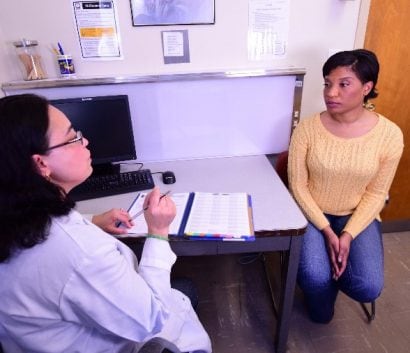TB Technical Instructions for Civil Surgeons
On November 1, 2023, CDC’s Division of Global Migration Health announced civil surgeons will begin using eMedical to enter the results of the status adjustment medical examination for applicants with TB classifications. Click here for more information.
What Health Department Staff Need to Know
Background
Persons living in the United States (U.S.) who apply to adjust their immigration status are required to undergo a medical examination as part of their application process. Tuberculosis (TB) is one of the diseases that is included in this examination. This examination is done by civil surgeons.
Who Are Civil Surgeons?
Civil surgeons are physicians who conduct medical examinations of persons living in the United States and applying for lawful permanent residence. In contrast, panel physicians are physicians working overseas who conduct examinations (including TB screening) on people who apply for immigrant or refugee status before coming to the United States.

What Are the Technical Instructions?
Technical Instructions are the requirements that civil surgeons and panel physicians must follow when evaluating persons as part of their application process. The CDC Division of Global Migration and Quarantine (DGMQ) develops these Technical Instructions. Updated TB Technical Instructions went into effect on October 1, 2018.
How Are the 2018 Technical Instructions for Civil Surgeons Different from the 2008 Technical Instructions?
The most significant changes to the TB technical instructions are:
- Blood tests (interferon-gamma release assays [IGRAs]) must be used instead of the tuberculin skin test (TST) to test all applicants 2 years of age or older for TB infection. The TST cannot be used as a substitute for an IGRA.
- Applicants diagnosed with latent TB infection (LTBI) must be reported to the health department.
- Civil surgeons who are independent of health departments must not refer applicants to a health department for IGRAs or chest x-rays; all IGRAs and chest x-rays ordered by civil surgeons must be performed independently of a health department.
- Class B0 is a new classification for applicants who complete pulmonary TB disease treatment successfully by directly observed therapy during the required medical examination process.
What Is Included in the 2018 TB Technical Instructions for Civil Surgeons?
Applicants must receive a complete medical examination for TB disease, which includes a medical history, physical examination, and an IGRA, if 2 years of age or older. A chest x-ray may also be required. All applicants with a positive IGRA, known HIV infection, or signs or symptoms of TB disease must have a chest x-ray. Applicants who have chest x-ray findings suggestive of TB disease, signs or symptoms of TB disease, or known HIV infection must be referred to the health department for further evaluation.
Applicants younger than 2 years of age must have a physical examination and history provided by a parent or another adult. Applicants younger than 2 years of age who have signs or symptoms of TB disease, or who have HIV infection must have a TST or an IGRA, must have a chest x-ray, and must be reported to the health department for further evaluation.
What if an Applicant Has Confirmed or Suspected TB Disease?
Civil surgeons must report all applicants with confirmed or suspected TB disease promptly to the health department. This is done to ensure that applicants are started on appropriate treatment and that a contact investigation is initiated if the applicant has TB disease.
What if an Applicant Has Latent TB Infection (LTBI)?
Civil surgeons must report applicants diagnosed with LTBI to the health department. This includes the applicant’s name, contact information, IGRA results, and chest x-ray results. Civil surgeons must inform applicants that their LTBI diagnosis will be reported to the health department. If an applicant has documentation of having previously completed LTBI treatment, the applicant does not need to be reported to the health department.
Treatment of LTBI is not required to complete the status adjustment process. However, civil surgeons should advise applicants about the importance of being treated for LTBI. Civil surgeons may offer voluntary treatment or refer applicants elsewhere for treatment. A variety of treatment options exist, including shorter-course regimens. Healthcare providers should prescribe the more convenient shorter regimens, when possible.
What Should Health Departments Do with LTBI Reports from Civil Surgeons?
To help eliminate TB, health departments are strongly encouraged to develop innovative opportunities for these individuals to receive LTBI treatment. Health departments should determine what actions to take based on the program’s resources and priorities. For example, some health departments may use the information for simple LTBI surveillance, whereas others may take it as an opportunity to provide LTBI treatment or refer to other providers who can provide treatment. For surveillance, health departments could simply count the number of LTBI notifications received from civil surgeons. If feasible, this information could be bolstered with additional information, such as demographic and diagnostic details of applicants who have LTBI.
It is up to health departments to determine how to report LTBI in their jurisdiction. Therefore, it is essential for civil surgeons and health departments to communicate with each other to coordinate reporting and referrals.
- Tuberculosis (TB) Technical Instructions, from the CDC Division of Global Migration and Quarantine: https://www.cdc.gov/immigrantrefugeehealth/exams/ti/civil/tuberculosis-civil-technical-instructions.html
- CDC Division of Global Migration and Quarantine: https://www.cdc.gov/ncezid/dgmq/
- CDC Division of Tuberculosis Elimination: https://www.cdc.gov/tb
- Latent Tuberculosis Infection: A Guide for Primary Health Care Providers: https://www.cdc.gov/tb/publications/ltbi/default.htm
- Treatment Regimens for Latent TB Infection (LTBI): https://www.cdc.gov/tb/topic/treatment/ltbi.htm